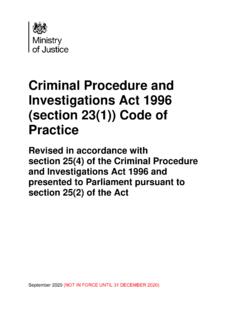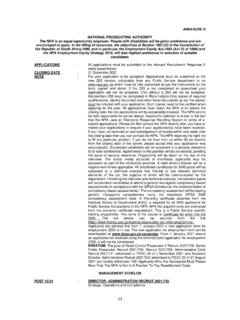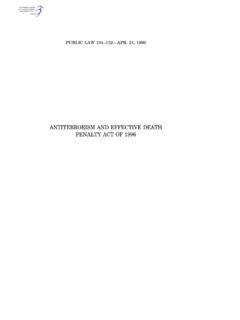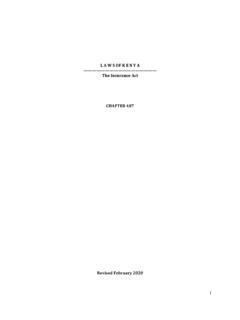Transcription of Criminal Procedure and Investigations Act 1996 (section 23 ...
1 Criminal Procedure and Investigations Act 1996 (section 23(1)) Code of Practice Revised in accordance with section 25(4) of the Criminal Procedure and Investigations Act 1996 March 2015 Criminal Procedure and Investigations Act 1996 (section 23(1)) Code of Practice Revised in accordance with section 25(4) of the Criminal Procedure and Investigations Act 1996 Crown copyright 2015 This publication is licensed under the terms of the Open Government Licence except where otherwise stated. To view this licence, visit or write to the Information Policy Team, The National Archives, Kew, London TW9 4DU, or email: Where we have identified any third party copyright information you will need to obtain permission from the copyright holders concerned.
2 This publication is available at Any enquiries regarding this publication should be sent to us at: Print ISBN 9781474114851 Web ISBN 9781474114868 ID 26011511 01/15 Printed on paper containing 75% recycled fibre content minimum. Printed in the UK by the Williams Lea Group on behalf of the Controller of Her Majesty s Stationery Office Criminal Procedure and Investigations Act 1996 (section 23(1)) 1 Contents Preamble 3 1. Introduction 3 2. Definitions 4 3. General responsibilities 6 4. Recording of information 7 5. Retention of material 8 (a) Duty to retain material 8 (b) Length of time for which material is to be retained. 9 6. Preparation of material for prosecutor 10 (a) Introduction 10 (b) Magistrates Court 10 (c) Crown Court 11 (d) Sensitive material Crown Court 11 7.
3 Revelation of material to prosecutor 13 8. Subsequent action by disclosure officer 14 9. Certification by disclosure officer 14 10. Disclosure of material to accused 15 Annex Criminal Procedure and Investigations Act 1996 (section 23(1)) 2 Criminal Procedure and Investigations Act 1996 (section 23(1)) 3 Criminal Procedure and Investigations Act 1996 Code of Practice under Part II Preamble This code of practice is issued under Part II of the Criminal Procedure and Investigations Act 1996 ( the Act ). It sets out the manner in which police officers are to record, retain and reveal to the prosecutor material obtained in a Criminal investigation and which may be relevant to the investigation , and related matters. 1. Introduction This code of practice applies in respect of Criminal Investigations conducted by police officers which begin on or after the day on which this code comes into effect.
4 Persons other than police officers who are charged with the duty of conducting an investigation as defined in the Act are to have regard to the relevant provisions of the code, and should take these into account in applying their own operating procedures . This code does not apply to persons who are not charged with the duty of conducting an investigation as defined in the Act. Nothing in this code applies to material intercepted in obedience to a warrant issued under section 2 of the Interception of Communications Act 1985 or section 5 of the Regulation of Investigatory Powers Act 2000, or to any copy of that material as defined in section 10 of the 1985 Act or section 15 of the 2000 Act. This code extends only to England and Wales. Criminal Procedure and Investigations Act 1996 (section 23(1)) 4 2.
5 Definitions In this code: a Criminal investigation is an investigation conducted by police officers with a view to it being ascertained whether a person should be charged with an offence, or whether a person charged with an offence is guilty of it. This will include: Investigations into crimes that have been committed; Investigations whose purpose is to ascertain whether a crime has been committed, with a view to the possible institution of Criminal proceedings; and Investigations which begin in the belief that a crime may be committed, for example when the police keep premises or individuals under observation for a period of time, with a view to the possible institution of Criminal proceedings; charging a person with an offence includes prosecution by way of summons or postal requisition; an investigator is any police officer involved in the conduct of a Criminal investigation .
6 All investigators have a responsibility for carrying out the duties imposed on them under this code, including in particular recording information, and retaining records of information and other material; the officer in charge of an investigation is the police officer responsible for directing a Criminal investigation . He is also responsible for ensuring that proper procedures are in place for recording information, and retaining records of information and other material, in the investigation ; the disclosure officer is the person responsible for examining material retained by the police during the investigation ; revealing material to the prosecutor during the investigation and any Criminal proceedings resulting from it, and certifying that he has done this; and disclosing material to the accused at the request of the prosecutor; the prosecutor is the authority responsible for the conduct, on behalf of the Crown, of Criminal proceedings resulting from a specific Criminal investigation .
7 Material is material of any kind, including information and objects, which is obtained or inspected in the course of a Criminal investigation and which may be relevant to the investigation . This includes not only material coming into the possession of the investigator (such as documents seized in the course of searching premises) but also material generated by him (such as interview records); material may be relevant to an investigation if it appears to an investigator, or to the officer in charge of an investigation , or to the disclosure officer, that it has some bearing on any offence under investigation or any person being investigated, or on the surrounding circumstances of the case, unless it is incapable of having any impact on the case.
8 Criminal Procedure and Investigations Act 1996 (section 23(1)) 5 sensitive material is material, the disclosure of which, the disclosure officer believes, would give rise to a real risk of serious prejudice to an important public interest; references to prosecution disclosure are to the duty of the prosecutor under sections 3 and 7A of the Act to disclose material which is in his possession or which he has inspected in pursuance of this code, and which might reasonably be considered capable of undermining the case against the accused, or of assisting the case for the accused; references to the disclosure of material to a person accused of an offence include references to the disclosure of material to his legal representative; references to police officers and to the chief officer of police include those employed in a police force as defined in section 3(3) of the Prosecution of Offences Act 1985.
9 Criminal Procedure and Investigations Act 1996 (section 23(1)) 6 3. General responsibilities The functions of the investigator, the officer in charge of an investigation and the disclosure officer are separate. Whether they are undertaken by one, two or more persons will depend on the complexity of the case and the administrative arrangements within each police force. Where they are undertaken by more than one person, close consultation between them is essential to the effective performance of the duties imposed by this code. In any Criminal investigation , one or more deputy disclosure officers may be appointed to assist the disclosure officer, and a deputy disclosure officer may perform any function of a disclosure officer as defined in paragraph The chief officer of police for each police force is responsible for putting in place arrangements to ensure that in every investigation the identity of the officer in charge of an investigation and the disclosure officer is recorded.
10 The chief officer of police for each police force shall ensure that disclosure officers and deputy disclosure officers have sufficient skills and authority, commensurate with the complexity of the investigation , to discharge their functions effectively. An individual must not be appointed as disclosure officer, or continue in that role, if that is likely to result in a conflict of interest, for instance, if the disclosure officer is the victim of the alleged crime which is the subject of the investigation . The advice of a more senior officer must always be sought if there is doubt as to whether a conflict of interest precludes an individual acting as disclosure officer. If thereafter the doubt remains, the advice of a prosecutor should be sought.

















